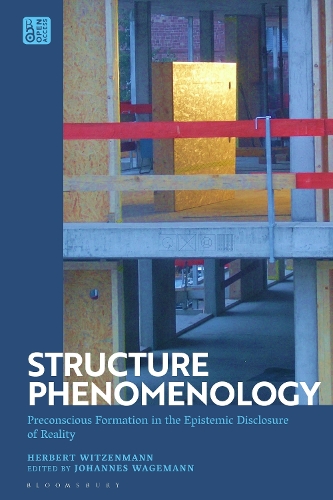
Structure Phenomenology: Preconscious Formation in the Epistemic Disclosure of Reality
(Hardback)
Available Formats
Publishing Details
Structure Phenomenology: Preconscious Formation in the Epistemic Disclosure of Reality
By (Author) Herbert Witzenmann
Edited by Professor Johannes Wagemann
Bloomsbury Publishing PLC
Bloomsbury Academic
22nd September 2022
United Kingdom
Classifications
Professional and Scholarly
Non Fiction
Philosophy: epistemology and theory of knowledge
Philosophy of mind
Cognition and cognitive psychology
142.7
Physical Properties
Hardback
176
Width 138mm, Height 216mm
Description
This is the first English translation of Herbert Witzenmanns seminal work, Strukturphnomenologie, which departs from the traditional phenomenological methods of Husserl, Sartre, and Merleau-Ponty to introduce a fresh approach to the nexus of consciousness and reality. In Structure Phenomenology, published open access, Witzenmann argues for the active mental, yet mostly pre-reflective, participation of humans in the emergence of individual consciousness of all kinds and the basic structure that determines it. While Witzenmann ascribes a derivative or memorative status to habitual states of phenomenal consciousness, even if they seem to refer to present objectivity, he proposes that the underlying formative processes be unveiled and explored through systematic first-person observation. Through his logically grounded and experience-based approach, he contends that it is not neural processes that produce consciousness, but rather ones own preconscious rootedness in reality which can be made conscious. Influenced by the writings of Rudolf Steiner and Johann Wolfgang von Goethe, Witzenmanns innovative approach casts new light on a number of philosophical, psychological, and scientific issues: from being and becoming to temporality and presence, and from remembering to mind and body. Even freedom takes on a new meaning when reality is not pre-given to human consciousness, but is rather a result of human participation in the basic process. This annotated translation makes Witzenmanns text accessible to an English audience for the first time and, with a comprehensive editorial introduction by Johannes Wagemann, situates his ground-breaking insights within the development of phenomenology, as well as in current philosophical and psychological debates. The ebook editions of this book are available open access under a CC BY-NC-ND 3.0 licence on bloomsburycollections.com.
Reviews
This book is a wide-ranging analysis and synthesis of how the principles and first-person methods of structural phenomenology cast light on conceptual and non-conceptual content of experience and enable insights into the constitution of intentional content and the formation of reality. It is a highly welcome addition and foundation for the growing interest in epistemological and phenomenological issues concerning the constitution of subjectivity and the world among scientists and laymen alike. * Christian Tewes, Adjunct Professor (Privatdozent) of Philosophy, University of Jena, Germany *
Author Bio
Herbert Witzenmann (19051988) was a German philosopher, known for his work on phenomenology, consciousness, and anthroposophy. His major influences include Rudolf Steiner, Goethe, and Husserl. Johannes Wagemann is Professor of Consciousness Studies at Alanus University, Mannheim, Germany.
